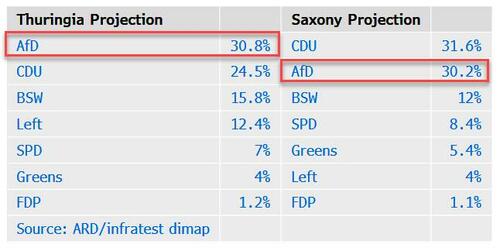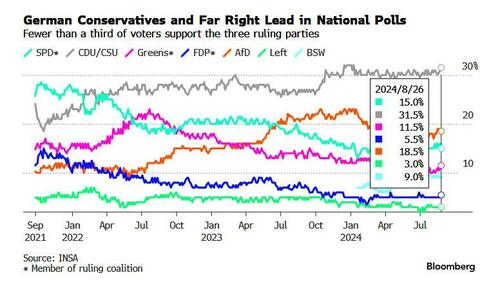
German Ruling Coalition Crushed In Regional Elections As AfD Scores First Victory For German Right-Wing Party Since WWII
Two months after the European political establishment suffered a crushing blow in the French elections, on Sunday afternoon we witnessed another demonstration of just how unpopular Europe’s political elite has become when German Chancellor Olaf Scholz’s ruling coalition was crushed in two regional elections in eastern Germany on Sunday, with populist parties on both the right and left winning about half the votes in both Thuringia and Saxony.
#BREAKING #Germany Exit polls indicate the far-right Alternative for Germany (AfD) party is poised to win the state election in Thuringia.
Marking the first time for a Right-wing party to lead in a German state since WWII. pic.twitter.com/sRsmHDlbJ0
— The National Independent (@NationalIndNews) September 1, 2024
The Alternative for Germany, often defined as “far-right” by most liberal media outlets, is on course for victory in Thuringia on 30.5%, according to projections Sunday for public broadcaster ARD; it represents the first victory for a German right-wing party on a state ballot since World War II (history buffs may recall that Thuringia is where the National Socialist German Workers’ Party, aka NSDAP, won their first state election in 1929).
A German far-right party is projected to win in regional elections for the first time since 1945, exit polls show https://t.co/ydtdPV95A4
— CNN (@CNN) September 1, 2024
What is just as shocking was the voter revulsion to Germany’s ruling coalition: the three parties in Scholz’s ruling alliance — the Social Democrats, the Greens and the Free Democrats — between them got less than 15% in each of the two states, while the FDP missed the 5% threshold for getting into either regional parliament and the Greens fell short in Thuringia. The only mainstream party to do relatively well was the conservative CDU, which is projected to win in Saxony – by the narrowest of margin vs the ADP – and finish second in Thuringia.
Germany’s AfD party on course to become the strongest party in the German state of Thuringia.
Exit polls predict the anti-immigration party has gained some 33% of the vote, neck and neck in Sachsen.
The tide is turning. pic.twitter.com/PL35fJLxJH
— Tommy Robinson 🇬🇧 (@TRobinsonNewEra) September 1, 2024
Alice Weidel, a co-leader of the AfD, called the party’s performance “historic” and “a requiem” for the coalition in Berlin and said voters clearly want the AfD in government as the strongest party in Thuringia. Scholz’s coalition “should be asking itself if it can even continue in office,” Weidel told ARD. While it’s unlikely to be able to convince any other party to join it in coalition, with more than a third of the seats in the state parliament it could potentially block major decisions such as judicial appointments.
It’s not just the right that is soaring: in Sunday’s voting, a new far-left party, the Buendnis Sahra Wagenknecht, was on 15.8% in Thuringia and 12% in Saxony, according to early projections and exit polling. Founded only in January after Wagenknecht split from the Left party, it’s likely to play a key role in attempts by mainstream parties to keep the AfD out of power in Thuringia.
Today’s results are the latest bitter blow to German chancellor Scholz and his deeply unpopular government and highlight the risk it faces ahead of the next national election due in just over a year. The picture looks equally dire for another state ballot in three weeks in Brandenburg: the region that surrounds the capital Berlin and is home to Scholz’s Potsdam constituency.
Parties opposing arms supplies to Ukraine lead polls in the eastern German elections 09/01 pic.twitter.com/nm3Ot2nQwW
— Ignorance, the root and stem of all evil (@ivan_8848) September 1, 2024
After months of squabbling over spending priorities, nationwide support for the three ruling parties has dwindled to record lows, while support for parties opposing financial and weapons supplies to Ukraine continues to soar. Backing for the conservative CDU/CSU alliance is on around 32% – roughly the same as the SPD, Greens and FDP combined – and the AfD is in second place on about 18%.
According to Bloomberg, the crushing defeat for the unpopular ruling parties in Saxony and Thuringia could prompt renewed calls for an early general election and fuel debate about whether Scholz is the right man to lead the Social Democrats into the ballot next September.
Kevin Kuehnert, the SPD general secretary, said the results in the two regions also send a message to the national government in Berlin: “We need to explain and communicate our policies more and much better, this applies not only for Saxony and Thuringia but for Germany as a whole,” Kuehnert told ZDF in a TV interview, adding that “we must become more self-confident within the ruling coalition and show much clearer to voters what the SPD stands for.” Which of course, is not the problem: Germany as a whole knows very well what SPD’s policies are, and is revolting against them.
Despite its victory in Thuringia, the AfD, which Germany’s authorities have classified as “right-wing extremist” in both regions that voted Sunday as well as nearby Saxony-Anhalt, has no clear path to forming a government as all other political groups have ruled out cooperating with the party — a firewall similar to the one that thwarted Marine Le Pen’s far-right National Rally in France after President Emmanuel Macron called a snap legislative election in June. That should limit any impact on financial markets, which were unsettled by the rise in popularity of French fringe parties.
Wagenknecht, whose party’s policies include stopping aid for Ukraine and curbing immigration, again ruled out any cooperation with the AfD in Thuringia. She indicated that she was ready to govern in a coalition with the CDU and the SPD.
“I don’t think that we’re seen by voters as an AfD light,” she told ZDF. “We are simply closing a representation gap in the political spectrum.”
The CDU’s solid performance Sunday could also impact the process of choosing a conservative chancellor candidate. The leader of the party, Friedrich Merz, seems likely to secure the nomination and can claim some credit for the success in Saxony.
However, a number of other hopefuls can’t yet be ruled out, including North Rhine-Westphalia Premier Hendrik Wuest and Bavaria Premier Markus Soeder, who leads the Christian Social Union, the CDU’s sister party in the southern region.
Merz has said the CDU and CSU will decide on their joint candidate after the Brandenburg vote. The final state election before the next national ballot is at the beginning of March in Hamburg, the port city where Scholz used to be mayor and his SPD rules in coalition with the Greens.
Some 3.3 million people were eligible to vote in Saxony, which borders Poland and the Czech Republic, and about 1.7 million in Thuringia.
Loading…
Originally Posted at; https://www.zerohedge.com//
Stay Updated with news.freeptomaineradio.com’s Daily Newsletter
Stay informed! Subscribe to our daily newsletter to receive updates on our latest blog posts directly in your inbox. Don’t let important information get buried by big tech.
Current subscribers:









